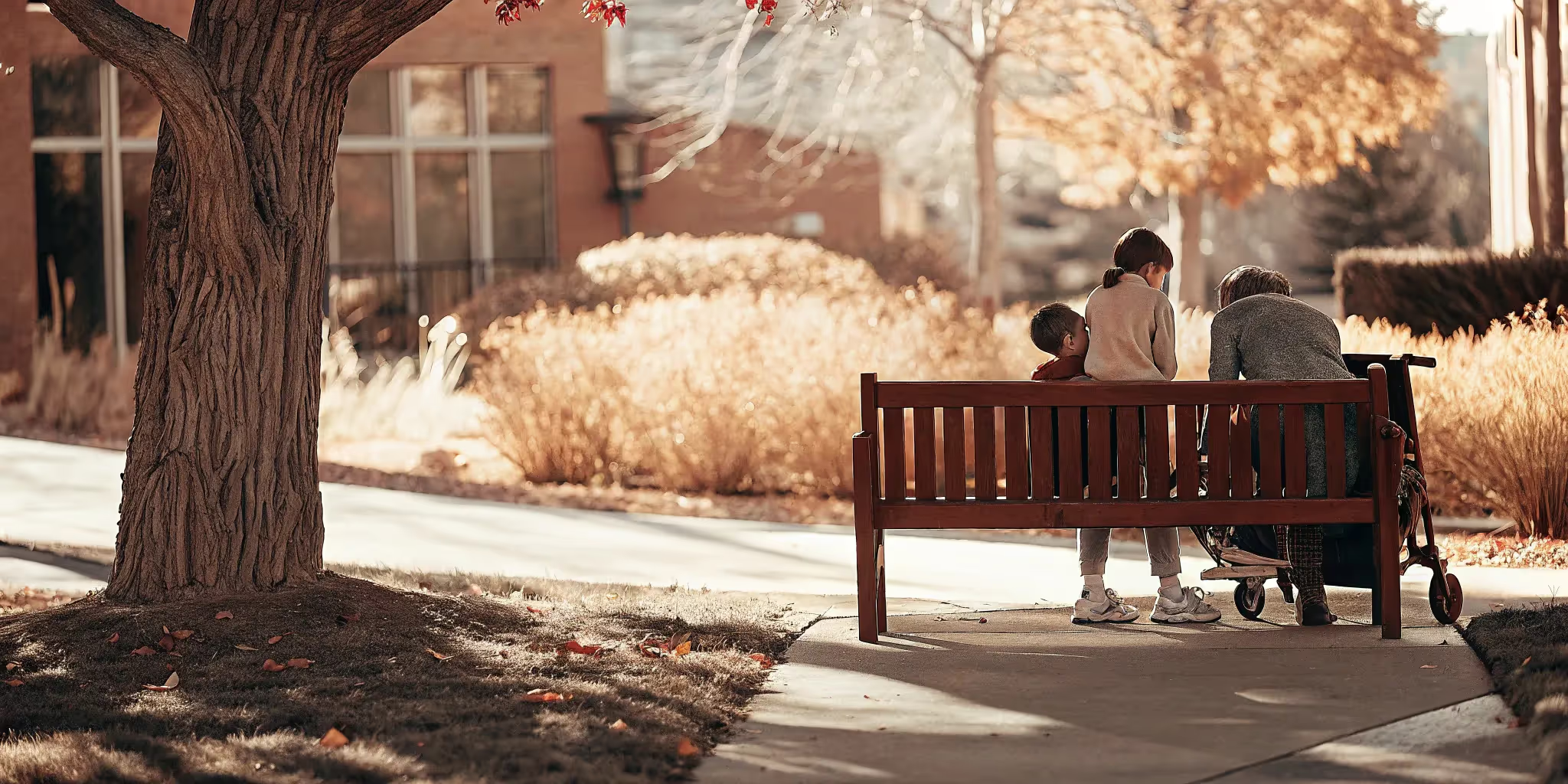Your Guide to Autism Resources in Lubbock, Texas

"Where do I even start?" It's the most common question families ask after an autism diagnosis, and it’s a valid one. The sheer volume of information can be paralyzing. The most effective approach is to begin with a single, trusted source and build from there. In Lubbock, that starting point is often the Burkhart Center at Texas Tech University, a central hub for education and outreach. This article will walk you through the first steps, beginning with foundational organizations and expanding into a full spectrum of support. We'll cover the essential autism resources Lubbock, Texas offers, giving you a clear, actionable plan for medical, therapeutic, and community services.
Key Takeaways
- Use the Burkhart Center as Your Roadmap: Instead of starting from scratch, use the center's local resource guide as your primary tool. It’s a comprehensive directory of vetted Lubbock-area services, covering everything from diagnostics to community activities.
- Assemble a Well-Rounded Care Team: A strong plan addresses the whole child by combining different professional services. Help families coordinate with ABA providers, speech and occupational therapists, and educational advocates to create a unified support system.
- Connect Families to Peer and Respite Support: Remember that caregivers need support, too. Guide families to local parent networks like the Lubbock Community Autism Network for shared understanding and encourage them to use respite care services to prevent burnout.
Where to Find Autism Support in Lubbock
Finding the right support network is a critical first step for families in Lubbock. The good news is that the city has a strong, interconnected community dedicated to providing resources for individuals with autism. Whether you're looking for diagnostic services, therapeutic interventions, or simply a group of people who understand, Lubbock offers several key organizations ready to help. These centers act as hubs, connecting families to the specific services they need and creating a supportive environment for growth and development. By knowing where to look, you can build a comprehensive support system for your clients and their families, ensuring they have access to the best possible care in West Texas.
Key Organizations and Support Centers
When you start your search for resources in Lubbock, two names will come up frequently: The Burkhart Center at Texas Tech University and the Lubbock Community Autism Network (LBK-CAN). The Burkhart Center is a major hub for education, research, and services, acting as a central point of contact for many families. For peer connection, the Lubbock Community Autism Network is a fantastic resource. It’s a parent-led group focused on building community through events and shared experiences, offering families a chance to connect with others who are on a similar path. Both organizations are foundational to the autism support landscape in the area.
What The Burkhart Center Offers
The Burkhart Center is more than just a building on the Texas Tech campus; it's a comprehensive resource dedicated to improving the lives of individuals with autism. Their work covers three main areas: education, research, and community outreach. For BCBAs and families, their website is an invaluable source of information on everything from evidence-based intervention strategies to guidance on working with the special education system. They provide direct services and are deeply involved in training the next generation of professionals in the field. Think of them as a cornerstone of the Lubbock autism community, providing credible information and tangible support.
Types of Support Available
One of the most helpful tools the Burkhart Center provides is its extensive local autism resource guide. This guide neatly categorizes the wide array of services available in the Lubbock area, making it much easier to find exactly what a family needs. The categories are incredibly thorough, covering everything from Advocacy and Behavioral Support to Employment Services, Medical Services, and Recreational Activities. This organized approach saves you time and helps you connect families with vetted providers for specialized needs, whether they're looking for early intervention programs or support for young adults transitioning into the workforce.
Find Medical and Diagnostic Services
Getting a clear diagnosis is the first and most critical step for families beginning their journey with autism. This formal evaluation opens the door to specialized therapies, school accommodations, and vital support services. The process can feel daunting, but Lubbock has dedicated professionals and organizations ready to help. From finding a reputable evaluation center to understanding insurance and financial aid, here’s how you can guide families through securing the medical services their child needs.
Local Evaluation Centers
In Lubbock, several trusted centers provide comprehensive evaluations for autism. The Burkhart Center's local resource guide is an excellent starting point, listing places like the TTU Psychology Clinic and Action Behavior Centers. These facilities are equipped to assess children and provide the formal diagnosis families need to access further services. Recommending a reputable evaluation center is one of the most impactful ways you can support a family that is just starting to seek answers. A definitive diagnosis is the key to unlocking a tailored plan that will help their child thrive.
Understanding Insurance Coverage
Once a family has a diagnosis, the next question is often about paying for services. Figuring out insurance can be complex, but many providers in Lubbock are experienced in this area. For example, Behavioral Innovations accepts a wide range of major insurance plans, including Aetna, Cigna, Humana, BlueCross BlueShield, and Texas Medicaid. It's always a good idea to advise families to call their insurance provider directly to check their specific eligibility, as coverage for ABA therapy and other services can vary between plans. Helping families understand their benefits upfront can prevent surprises and ensure consistent access to care.
How the ELMO Grant Program Helps
For families concerned about the cost of therapy, grant programs can be a lifeline. The ELMO Grant Program, highlighted by the Burkhart Center, is a fantastic local resource. This program provides free Applied Behavior Analytic (ABA) services to children of any age with an autism diagnosis. While it has a special focus on serving the East Lubbock community, its support extends to families throughout Texas. This grant removes a significant financial barrier, allowing children to receive critical intervention and ongoing therapy without straining the family's budget. It’s a vital option to share with clients who may not qualify for other aid.
Financial Assistance Options
Beyond insurance and specific grants, broader financial assistance is also available. A great starting point for families is their local Community Action Agency. As Autism Speaks suggests, nearly every community has one of these non-profit organizations that receive state and federal funding to help residents with a variety of needs. These agencies can connect families with local programs, offer direct assistance, or guide them to other resources they may not have known about. Encouraging families to reach out to their local agency can uncover a network of support that helps manage the costs associated with autism care.
Explore Therapy and Treatment Options
Finding the right mix of therapies is a cornerstone of creating an effective and holistic care plan. In Lubbock, you have access to a strong network of providers across various disciplines, which makes connecting families with specialized support much more manageable. From ABA to speech and occupational therapy, the goal is to build a collaborative team that helps your clients thrive. As a BCBA, you’re often the central coordinator for this team, and knowing the local landscape is key to making strong referrals. This guide will walk you through some of the key therapy and treatment options available in the area, so you can feel confident in the recommendations you provide. Building a comprehensive support system involves more than just one type of intervention; it's about creating a web of care that addresses the whole child. It’s about finding providers who not only have the right clinical skills but also fit well with a family’s values and a child’s unique personality. When you can guide parents to these resources, you empower them to build the best possible team for their child, fostering collaboration and ensuring every aspect of their development is supported.
ABA Therapy Programs
As a BCBA, you know the impact of high-quality ABA therapy. In Lubbock, you can find centers dedicated to evidence-based practices. For example, Behavioral Innovations provides one-on-one ABA therapy for children with autism at its Southwest Lubbock location, serving families from surrounding communities like Wolfforth and Reese Center. They focus on using proven, up-to-date treatment methods to help children develop crucial skills. When referring families, it’s always helpful to encourage them to tour different centers and meet the staff to find the environment that best suits their child’s personality and specific needs. This personal connection can make all the difference in a family's comfort and a child's progress.
Speech and Occupational Services
Communication and daily living skills are often a major focus of a child's treatment plan. Lubbock has a wealth of resources for both speech and occupational therapy. The Burkhart Center for Autism Education & Research maintains a fantastic local autism resource guide that lists numerous providers. For speech therapy, you can find services at places like Covenant Children's Hospital and the TTUHSC Speech, Language and Hearing Clinic. For occupational therapy, options include Pediatric Therapy Inc., H2 Health, and Aveanna Healthcare, all of which are experienced in working with children with autism to build independence and confidence in their daily routines.
Physical and Sensory Integration Therapy
For children who benefit from therapy focused on motor skills and sensory processing, Lubbock offers unique and engaging options. Equine-assisted therapy, for instance, can be a powerful tool for physical and sensory integration. This type of therapy uses the movement of the horse to help with balance, coordination, and sensory input. Local organizations like the Texas Tech Therapeutic Riding Center and Refuge Services provide these specialized horse-assisted programs. They offer a wonderful alternative to traditional clinic settings and can be especially motivating for children who love animals and the outdoors. It's a great option to keep in mind for clients who may not respond as well to indoor therapy environments.
Mental Health Support Services
Supporting a child’s mental and emotional well-being is just as important as addressing their behavioral and developmental needs. Many individuals with autism also face challenges with anxiety, depression, or emotional regulation. Fortunately, Lubbock has mental health providers who specialize in supporting the neurodiverse community. The TTU Family Clinic and private practices like Driskill & Bates Psychology offer counseling and therapy services tailored to individuals with autism. Connecting families with this type of support can provide them with essential coping strategies and a safe space to work through emotional challenges. It’s a critical piece of a truly comprehensive care plan that supports the whole person, not just their diagnosis.
Discover Educational Resources
Education is a cornerstone of development for every child, and for children with autism, finding the right educational path is key to helping them thrive. From the moment of diagnosis through adulthood, a strong educational framework provides structure, skills, and opportunities for growth. In Lubbock, families and providers have access to a robust network of resources designed to support learners at every stage. Whether you're looking for early intervention programs to build foundational skills, navigating the special education system in local schools, or exploring options for life after high school, there are dedicated organizations ready to help.
This support system extends to parents and caregivers, too. Understanding how to advocate for your child and reinforce learning at home is just as important as the services they receive. Thankfully, several local programs offer training and resources to empower parents on this journey. The key is knowing where to look. Texas Tech University’s Burkhart Center, for example, is a central hub for information, providing guidance that connects families with the services they need to build a comprehensive and effective educational plan for their child.
Early Intervention Services
Getting an early start can make a significant difference in a child's developmental trajectory. Early intervention services are designed to provide critical support from a young age, helping children with autism build essential communication, social, and cognitive skills. For families in Lubbock and the surrounding West Texas area, finding the right programs is the first step. The Burkhart Center at Texas Tech University provides a comprehensive guide to help families identify services and activities tailored to their child’s specific needs. This resource is an invaluable starting point for connecting with local providers who can create a strong foundation for future learning and success.
Special Education in Local Schools
Navigating the special education system can feel overwhelming, but you don't have to do it alone. Local schools are required to provide support for children with autism, and understanding your rights and options is crucial to ensuring your child receives an appropriate education. Advocacy groups are vital partners in this process. Organizations like Disability Rights Texas and Life Inc. specialize in helping families understand and access special education services. They can provide the guidance and support needed to work with school districts, develop effective Individualized Education Programs (IEPs), and make sure your child’s educational needs are met every step of the way.
Options After High School
The transition from high school to adulthood is a major milestone. For adults with autism, continuing education and job training are key to building an independent and fulfilling life. Lubbock offers excellent programs designed to bridge this gap and provide the necessary support for success. For instance, the Burkhart Center Transition Academy and the Reach High Program are specifically created to support adults with autism as they pursue higher education and vocational training. These programs focus on developing practical skills, fostering independence, and preparing individuals for the workforce, opening doors to new opportunities after graduation.
Parent Training Programs
Parents are their child's first and most important advocates. Equipping yourself with knowledge and skills is one of the best ways to support your child's development. Several local organizations offer programs designed to provide parents with essential information, resources, and a supportive community. Groups like The HALI Project, The Parenting Cottage, and Uniting Parents offer training for parents that empowers them to advocate effectively for their children. These programs cover a range of topics, from understanding autism to navigating service systems, giving you the confidence and tools to be a strong partner in your child’s care team.
Connect with Family Support Networks
Building a strong support system is one of the most important things a family can do. Connecting with other parents, finding advocates, and knowing where to turn for help can make a world of difference. For families of autistic children, these networks provide not just practical resources but also a sense of community and understanding. Guiding the families you work with toward these connections is a vital part of providing comprehensive care. Here are some of the key family support networks available in the Lubbock area.
Local Support Groups
Finding a community of people who truly understand the day-to-day realities of raising an autistic child is invaluable. Local support groups offer a space for parents to share experiences, exchange advice, and build lasting friendships. In Lubbock, a great starting point is the Lubbock Community Autism Network (LBK-CAN). This group focuses on making life easier for families by organizing events, sharing resources, and fostering a strong support system. It’s a place where parents can connect with others on a similar journey, reducing feelings of isolation and creating a network of mutual support that benefits both parents and their children.
Parent Advocacy Resources
Navigating the systems of care and education can be overwhelming, which is why advocacy resources are so important. These organizations help parents understand their rights and empower them to be effective advocates for their children. The Burkhart Center at Texas Tech University has compiled an excellent local autism resource guide that points families toward key advocacy groups like Disability Rights Texas and Life Inc. These organizations can provide information, support, and representation to ensure children receive the services and accommodations they need to thrive in school and the community. Helping families connect with these resources gives them the tools to champion their child’s needs confidently.
Find Respite Care Services
Caring for a child with unique needs is a full-time job, and every caregiver needs a break to rest and recharge. Respite care provides temporary relief, which is essential for maintaining a family’s well-being. It allows parents and other caregivers to take time for themselves, knowing their child is in capable hands. The Burkhart Center’s guide also lists local providers that offer these services. For instance, agencies like BrightStar and Synergy HomeCare can provide short-term or long-term care, giving families the flexible support they need. Encouraging families to explore respite care is a crucial step in preventing caregiver burnout and promoting a healthy family dynamic.
Know Your Crisis Support Options
While we hope families never need them, knowing where to turn during a crisis is critical. Having a plan in place before a difficult situation arises can provide peace of mind and ensure a family can get help quickly. It’s important to identify resources that can offer immediate assistance, whether it’s for a behavioral, medical, or family emergency. The Burkhart Center for Autism Education & Research is a central hub for information and can direct families to appropriate crisis support services in the Lubbock area. By helping families identify these options ahead of time, you can empower them to handle challenging moments with greater confidence and support.
Get Involved in Community Activities
Connecting with the community is a fantastic way for children with autism to build confidence, practice social skills, and simply have fun. Lubbock offers a variety of programs designed to be inclusive and supportive, giving families a chance to explore new interests in a welcoming environment. From sports to arts, these activities provide structured opportunities for engagement and growth. As a BCBA, knowing about these local gems can be incredibly helpful when you're working with families to generalize skills and improve their quality of life. Sharing these resources can empower parents to find outlets where their child can thrive outside of therapy sessions. Below are some of the best community-based activities in the Lubbock area that cater to individuals on the autism spectrum.
Adaptive Sports Programs
Physical activity is essential for every child, and adaptive sports programs ensure that kids with different needs can participate fully. These programs focus on building physical skills, coordination, and teamwork in a modified, supportive setting. In Lubbock, a great example is the Ballet Lubbock ASD Classes held on Saturdays. This program is specifically designed for individuals with ASD and other disabilities, offering a wonderful opportunity to engage in a creative physical art form. It’s a safe space for participants to develop motor skills, follow directions, and interact with peers, all while learning the fundamentals of ballet.
Social Skills Development Groups
For many children with autism, navigating social situations can be challenging. Social skills groups provide a structured and supportive environment to practice these crucial skills with peers. The Lubbock Community Autism Network (LBK-CAN) is a cornerstone of the local community, providing events and resources that help families connect. Their focus is on creating a strong support system and fostering social skills through engaging community activities. By participating in events organized by groups like LBK-CAN, children can practice communication, turn-taking, and friendship-building in a natural and fun setting, making the learning process feel less like a lesson and more like play.
Arts and Music Activities
Creative expression can be a powerful outlet for children with autism, allowing them to communicate and connect in non-verbal ways. Arts and music programs offer a fantastic avenue for self-expression, sensory exploration, and fine motor skill development. Once again, the Ballet Lubbock ASD Classes stand out as a wonderful local resource. These classes are tailored to engage individuals with autism in the arts, helping them build confidence and find new ways to express themselves. Activities like these not only nurture artistic talents but also encourage social interaction and cooperation in a group setting, blending therapeutic benefits with creative fun.
Sensory-Friendly Events
Going to the movies or attending a community event can be overwhelming for individuals with sensory sensitivities. Thankfully, many organizations now offer sensory-friendly events that are designed to be more comfortable and accommodating. These events typically feature lower sound, dimmed lights, and a more relaxed atmosphere where moving around is acceptable. For example, you can find AMC Sensory-Friendly Films that create a welcoming viewing experience for families. These thoughtful adjustments make it possible for everyone to enjoy a classic family outing without the stress of sensory overload, ensuring a positive and inclusive experience for all attendees.
Summer Camps and Programs
Summer can be a long stretch without the structure of school, and camps provide a perfect solution for keeping kids engaged and learning. Many summer programs in the Lubbock area are designed to cater to the unique interests and needs of autistic children, offering a mix of fun, learning, and social opportunities. Community events, like the annual Burkhart Walk for Autism, also highlight the strong local support network and often point families toward seasonal programs. These camps and events offer a fantastic way for children to explore new hobbies, make friends, and practice their skills in a relaxed and supportive environment during the school break.
How to Access Services and Support
Finding and organizing the right services can feel like a full-time job, but you don’t have to start from scratch. Lubbock has a strong network of resources designed to guide families through the process. The key is knowing where to look first and how to piece together a plan that fits your client’s specific needs. By starting with a central resource and building a collaborative team, you can create a clear path forward for accessing care, managing appointments, and ensuring consistent support. This approach helps turn a long list of possibilities into a manageable and effective action plan.
Your First Steps
When a family is ready to find support, their first move should be to check out the Local Autism Resource Guide created by the Burkhart Center for Autism Education and Research at Texas Tech University. This guide is an incredible starting point, designed specifically to help individuals and families find services and activities in Lubbock and West Texas. It’s a comprehensive directory that cuts through the noise, providing a curated list of trusted resources. Think of it as the local map for autism services—it’s the best place to get your bearings and see what’s available.
Create a Cohesive Care Plan
A great care plan is more than just a list of appointments; it’s a coordinated effort. The Local Autism Resource Guide is the perfect tool for building one. It includes contact information for a wide range of supports, including doctors, specialists, social groups, and community events. You can use this information to help families create a tailored plan that addresses their unique goals. By pulling together different services, you can build a cohesive strategy that supports your client from all angles, ensuring everyone on the care team is working toward the same outcomes.
Tips for Coordinating Services
As you coordinate services, remember to lean on established organizations that can act as partners. Centers like the Burkhart Center, Behavioral Innovations, and Early Childhood Intervention (ECI) are invaluable allies. They provide direct services that complement ABA therapy, from managing challenging behaviors to teaching new skills and offering family training. Building relationships with these organizations can help you create a more robust support system for your clients, making it easier to manage the complexities of care and ensure families feel supported every step of the way.
Transportation Resources
Practical barriers like transportation can easily derail even the best-laid plans. If a family needs help getting to and from appointments, the Texas Workforce Commission offers resources that can help. While primarily focused on employment, their services can provide the stability and support families need to maintain access to consistent care. This is a great resource to keep in your back pocket for families who may be struggling with the logistical side of treatment, ensuring they can attend sessions and community activities without interruption.
More Helpful Lubbock Resources
Beyond therapy and educational programs, a strong support system includes knowing where to turn for state, legal, and emergency assistance. Having these resources on hand can provide peace of mind and a crucial safety net for families. Think of this as your directory for the practical, everyday challenges that can arise, from understanding your legal rights to finding reliable information online. These organizations and programs are designed to offer guidance and support, helping you build a comprehensive care network for your child and family. By familiarizing yourself with these options, you can feel more prepared to handle whatever comes your way, ensuring you have the backing you need at every stage.
State Benefit Programs
Planning for the future is a big part of the journey, and state benefits can play a key role. The Texas Workforce Commission, for example, is a fantastic resource for families thinking about employment. This agency helps individuals with disabilities find and keep jobs through vocational rehabilitation services. They offer support tailored to different needs, which can be invaluable for young adults with autism transitioning into the workforce. Connecting with them can open doors to employment opportunities and services that foster long-term independence and financial stability for your loved one.
Legal Support Services
Understanding your family’s rights is essential for effective advocacy, especially when it comes to education and accessing services. Organizations like Disability Rights Texas and Life Inc. are dedicated to providing legal support and guidance. They help families understand the laws that protect individuals with disabilities and can assist you in securing the services your child is entitled to, particularly from public schools. If you're struggling with an IEP meeting or feel your child isn't receiving the proper accommodations, these groups can offer the expertise and support you need to ensure their rights are upheld.
Helpful Online Resources
When you need trusted information, it helps to know where to look online. National organizations like the CDC, The Autism Society, and Autism Speaks offer a wealth of research, articles, and guides. Autism Speaks, in particular, provides a collection of free toolkits that cover a wide range of topics. You can find practical advice for newly diagnosed families, guides for school-age challenges, advocacy tips, and strategies for managing challenging behaviors. These resources are excellent for gaining knowledge and finding actionable steps you can take to support your child.
Emergency Assistance Options
Caring for a loved one is a marathon, not a sprint, and every caregiver needs a break to recharge. Respite care services offer temporary relief for primary caregivers, which is essential for preventing burnout. Local providers like BrightStar and Synergy HomeCare can offer short-term or long-term in-home care, giving you time to rest, run errands, or simply focus on your own well-being. Having a trusted respite care provider on call can also be a lifesaver during unexpected emergencies, ensuring your loved one is in good hands when you can't be there.
Build Your Support System
A strong support system is the foundation for success, both for the families you serve and for you as a provider. Helping your clients build a network of community, professional, and local resources creates a more holistic and sustainable care environment. Here’s how you can guide families to the right connections in Lubbock.
Make Community Connections
No one should feel like they’re on this journey alone. Connecting with other families who share similar experiences can provide incredible emotional support and practical advice. You can point your clients toward local organizations like The HALI Project, The Parenting Cottage, and Uniting Parents, which all offer training and a sense of community. For virtual support, the Lubbock Community Autism Network (LBK-CAN) is a great online group for families to connect. The Burkhart Center at Texas Tech University provides a fantastic guide to these groups, making it easy for families to find their people and build lasting relationships with others who truly understand.
Locate Local Resource Centers
Finding the right services can feel overwhelming, but resource centers simplify the process by gathering everything in one place. Instead of searching endlessly online, families can turn to a single, trusted source. The Burkhart Center’s local resource guide is a perfect example of this. It’s a comprehensive directory that lists contact information for doctors, specialists, social groups, and family support services throughout the Lubbock area. By directing families to hubs like this, you empower them to quickly find the specific help they need, saving them valuable time and energy that can be better spent supporting their child. It’s a simple step that makes a huge difference.
Assemble Your Professional Team
As a BCBA, you are a key part of a child’s professional team, but collaboration is essential for comprehensive care. Lubbock has a strong network of professionals you can coordinate with to support your clients. For specialized ABA therapy, centers like Behavioral Innovations offer tailored one-on-one programs. For diagnostics and evaluations, the TTU Psychology Clinic and Action Behavior Centers are excellent resources. By helping families assemble a cohesive team of therapists, doctors, and specialists, you ensure every aspect of their child’s development is addressed. This collaborative approach not only improves outcomes but also provides families with a well-rounded and unified support structure they can rely on.
Related Articles
- Guide to Autism Resources & Support in Texas - Alpaca Health
- Guide to Autism Resources & Support in Texas
- Your Guide to Autism Resources in Houston, Texas
- Best Autism Providers in Corpus Christi, Texas
- Top Autism Providers in Dallas, Texas: A Family Guide
Frequently Asked Questions
This is a lot of information. If a family is just starting out, what's the single best first step? The best place to start is the Local Autism Resource Guide from the Burkhart Center at Texas Tech. Think of it as a master directory for everything in Lubbock. It saves families from endless searching by putting vetted doctors, therapists, and support groups all in one place, making it much easier to figure out what to do next.
The Burkhart Center seems to be a key resource. What exactly is its role in the Lubbock community? You're right, it's a central hub for the autism community in West Texas. The Burkhart Center is part of Texas Tech University and focuses on education, research, and community outreach. For families and providers, it's the go-to source for credible information, professional training, and direct connections to local services, including their incredibly helpful resource guide.
How can I advise families who are worried about the cost of therapy and other services? It's a common concern, but Lubbock has several options. Many providers accept major insurance plans, including Texas Medicaid. For extra help, you can point families toward the ELMO Grant Program, which offers free ABA services. It's also worth suggesting they contact their local Community Action Agency, which can connect them with various financial assistance programs they might not know about.
What are the best resources for families who feel isolated and want to connect with other parents? The Lubbock Community Autism Network, or LBK-CAN, is a fantastic parent-led group perfect for this. They organize events and create a space where families can share experiences and build a real sense of community. You can also suggest parent training groups like The HALI Project or Uniting Parents, which offer both education and a chance to connect with others on a similar path.
Beyond therapy, what are some fun, inclusive activities for kids with autism in Lubbock? Lubbock has some great options that help kids practice skills in a fun, low-pressure setting. You can find adaptive sports like the Ballet Lubbock ASD Classes or equine therapy at the Texas Tech Therapeutic Riding Center. For a quieter outing, AMC offers sensory-friendly film screenings. These activities are designed to be welcoming and give kids a chance to explore their interests and just be kids.
High Quality, Local ABA
If you are ready to partner with a local BCBA and receive the highest quality of care, reach out today!













